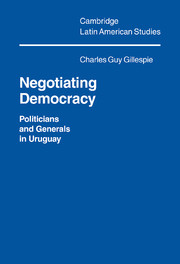Book contents
- Frontmatter
- Contents
- Foreword by Juan Linz
- Acknowledgments
- 1 Introduction: Political parties, theories of regime change, and the Uruguayan case
- PART I THE CRISIS AND SURVIVAL OF URUGUAYAN POLITICAL PARTIES
- PART II FROM AUTHORITARIAN CRISIS TO TRANSITION
- PART III POLITICAL PARTIES AND DEMOCRATIC CONSOLIDATION
- 9 The competition for support: leadership strategies and electoral behavior before and after the 1984 elections
- 10 The legacies of authoritarianism and the challenges for democracy
- Conclusion: Parties and regime change – some lessons and comparisons
- Appendix
- Bibliography
- Index
- CAMBRIDGE LATIN AMERICAN STUDIES
9 - The competition for support: leadership strategies and electoral behavior before and after the 1984 elections
Published online by Cambridge University Press: 11 September 2009
- Frontmatter
- Contents
- Foreword by Juan Linz
- Acknowledgments
- 1 Introduction: Political parties, theories of regime change, and the Uruguayan case
- PART I THE CRISIS AND SURVIVAL OF URUGUAYAN POLITICAL PARTIES
- PART II FROM AUTHORITARIAN CRISIS TO TRANSITION
- PART III POLITICAL PARTIES AND DEMOCRATIC CONSOLIDATION
- 9 The competition for support: leadership strategies and electoral behavior before and after the 1984 elections
- 10 The legacies of authoritarianism and the challenges for democracy
- Conclusion: Parties and regime change – some lessons and comparisons
- Appendix
- Bibliography
- Index
- CAMBRIDGE LATIN AMERICAN STUDIES
Summary
Responsibility for the future lay squarely in the hands of Uruguay's parties. Their leaders had determined the course of the transition from authoritarianism, and now they would be the central actors in determining the success of democracy. The overwhelming issue became the Naval Club pact, and the Blancos' accusation that it presaged a continuation of military power. Political tensions were enormous: Democratic consolidation depended not only on party strategies in the elections but also on reactions to the results and the parties' patterns of cooperation and competition once the new government had been installed. Would the Blancos abide by the results, or would they impugn the legitimacy of the new democracy from the start? How much had politicians learned from the past? How much, if at all, had parties' leadership and internal structures changed since the unhappy days of the breakdown? How deep was their willingness to compromise to protect civilian rule?
Pressures for change in the Uruguayan party system came from three sources: from the military, with their undying ambition to root out “subversion”; from the electorate, as voters punished those politicians whom they blamed for the country's ills; and from inside the parties, as young Uruguayans became activists and new leaders arose. However, all too often those three types of pressures pulled in different directions. Addressing the Colorado convention, Sanguinetti stated the challenge:
The country can only democratize by means of a party functioning democratically internally. The country does not want to see the old style of politics return. The country does not want personality conflicts.
- Type
- Chapter
- Information
- Negotiating DemocracyPoliticians and Generals in Uruguay, pp. 195 - 216Publisher: Cambridge University PressPrint publication year: 1991



